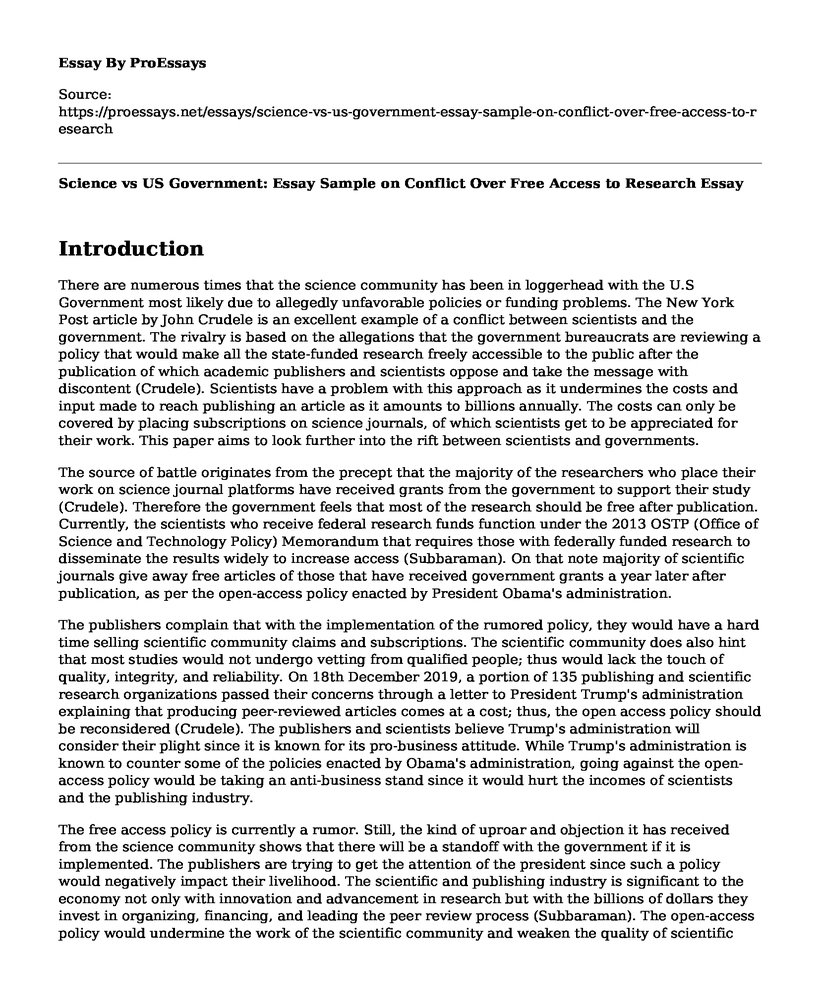Introduction
There are numerous times that the science community has been in loggerhead with the U.S Government most likely due to allegedly unfavorable policies or funding problems. The New York Post article by John Crudele is an excellent example of a conflict between scientists and the government. The rivalry is based on the allegations that the government bureaucrats are reviewing a policy that would make all the state-funded research freely accessible to the public after the publication of which academic publishers and scientists oppose and take the message with discontent (Crudele). Scientists have a problem with this approach as it undermines the costs and input made to reach publishing an article as it amounts to billions annually. The costs can only be covered by placing subscriptions on science journals, of which scientists get to be appreciated for their work. This paper aims to look further into the rift between scientists and governments.
The source of battle originates from the precept that the majority of the researchers who place their work on science journal platforms have received grants from the government to support their study (Crudele). Therefore the government feels that most of the research should be free after publication. Currently, the scientists who receive federal research funds function under the 2013 OSTP (Office of Science and Technology Policy) Memorandum that requires those with federally funded research to disseminate the results widely to increase access (Subbaraman). On that note majority of scientific journals give away free articles of those that have received government grants a year later after publication, as per the open-access policy enacted by President Obama's administration.
The publishers complain that with the implementation of the rumored policy, they would have a hard time selling scientific community claims and subscriptions. The scientific community does also hint that most studies would not undergo vetting from qualified people; thus would lack the touch of quality, integrity, and reliability. On 18th December 2019, a portion of 135 publishing and scientific research organizations passed their concerns through a letter to President Trump's administration explaining that producing peer-reviewed articles comes at a cost; thus, the open access policy should be reconsidered (Crudele). The publishers and scientists believe Trump's administration will consider their plight since it is known for its pro-business attitude. While Trump's administration is known to counter some of the policies enacted by Obama's administration, going against the open-access policy would be taking an anti-business stand since it would hurt the incomes of scientists and the publishing industry.
The free access policy is currently a rumor. Still, the kind of uproar and objection it has received from the science community shows that there will be a standoff with the government if it is implemented. The publishers are trying to get the attention of the president since such a policy would negatively impact their livelihood. The scientific and publishing industry is significant to the economy not only with innovation and advancement in research but with the billions of dollars they invest in organizing, financing, and leading the peer review process (Subbaraman). The open-access policy would undermine the work of the scientific community and weaken the quality of scientific research since more articles will be published without verification.
Conclusion
This paper does show that science and politics are related and depend on each other. Science is not only controlled by policies in politics but also get their resources from the government. With control, there are always conflicts since each party believes to have the necessary knowledge to impact within its realm and to their best of interest. The government acts within its beliefs and policies, which at times may involve overstepping on the scientific facts; for example, the aspect of global warming and pollution is a scientifically proven fact but what is done with such results is politically based on benefits or losses from the outcomes of the phenomena. The conflict between the government and scientific community is a matter that was, is, and will continue to be at times controversial based on the ideologies of each party.
Works Cited
Crudele, John. "Science Journals Fear Order That Would Make Articles Free". Nypost.Com, 2020, https://nypost.com/2020/02/12/science-community-fears-executive-order-that-would-make-medical-articles-free/.
Subbaraman, Nidhi. "Rumours Fly About Changes To US Government Open-Access Policy". Nature.Com, 2019, https://www.nature.com/articles/d41586-019-03926-1.
Cite this page
Science vs US Government: Essay Sample on Conflict Over Free Access to Research. (2023, Apr 08). Retrieved from https://proessays.net/essays/science-vs-us-government-essay-sample-on-conflict-over-free-access-to-research
If you are the original author of this essay and no longer wish to have it published on the ProEssays website, please click below to request its removal:
- American Policies and Actions 1945-1975 Essay
- Essay Sample on Presidential Advisor
- America's Constitution: Debate Over Its Meaning & Significance - Essay Sample
- Global Citizens Prefer Democratic Governments: Cross-National Study
- Community Policing: Enhancing Quality and Safety of Neighborhoods With Public Participation - Research Paper
- Paper Example on COVID-19: Global Economic Crisis - Millions Infected, Businesses Counting Losses
- Paper Example on Exploring Geriatrics, Poverty, and Pediatrics: A Study of South-East Asia's Sentinel City







